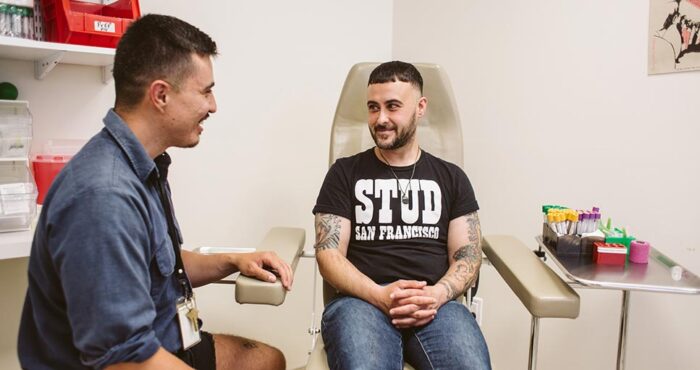What is AIDS Survivor Syndrome?
Last November, long-term survivors in San Francisco—and other interested community members—gathered to hear Ron Stall, PhD, from the University of Pittsburgh, present his research on AIDS Survivor Syndrome.
Organized by Tez Anderson, the director of the San Francisco nonprofit “Let’s Kick ASS” [AIDS Survivor Syndrome], the community forum offered a chance for long-term survivors to learn about a condition theorized to affect some people who have lived through the worst days of the AIDS epidemic.
“HIV is a very specific trauma,” explained Vince Crisostomo, the manager of the Elizabeth Taylor 50-Plus Network at San Francisco AIDS Foundation. “Some people compare living through the epidemic as living through the Holocaust, or being in a war.”
During the community forum, Stall explained that what differentiates AIDS Survivor Syndrome from something like post-traumatic stress disorder (PTSD) is the length of time a person can be affected.
Anderson, for example, was diagnosed in 1987, and watched hundreds of friends and lovers pass away before effective HIV therapies were developed. His own health suffered, and every few years his doctors would tell him he didn’t have much more time to live. After living to see the roll-out of protease inhibitors and modern-day HAART in the 1990s, Anderson said the trauma of HIV started to take on a slightly different tenor.
“I started getting this creeping notion in the back of my mind that, ‘I may become an old person with HIV,’ which brought a new set of anxieties,” he said. “I didn’t plan for being old.”
Stall said the term “AIDS Survivor Syndrome” is used to describe the constellation of physical, psychological and emotional symptoms that a person (either HIV-negative or HIV-positive) may experience after living through intense grief and trauma during the years of the AIDS epidemic and after.
Symptoms may include: depression, uncertainty about the future, suicidality, feelings of panic from growing older, social isolation and social withdrawal, survivor’s guilt, and more. Read the full list of symptoms and Anderson’s explanation of AIDS Survivor Syndrome.
The research on AIDS Survivor Syndrome
Stall, using data from the Multicenter AIDS Cohort Study (MACS), has been studying AIDS Survivor Syndrome and how it affects people who have lived through the HIV epidemic. Started in 1983, the MACS is a study of more than 7,000 of men who have sex with men (both HIV-negative and HIV-positive) who complete twice-yearly health and behavioral assessments to study the health effects of HIV infection. Stall reported that as of 2013, the average age of people in the study was 56, and roughly half of the men (49%) were living with HIV.
More than a quarter (27%) of men surveyed in the study had lost more than 10 people close to them to AIDS. 35% of men reported that they “still grieve” for these lost people, 7% of men reported that they “still deeply grieve,” and 3% reported that they “grieve these losses nearly every day.” About half (49%) agreed with the statement that “Because of the HIV epidemic, I never thought I would live as long as I have.”
To assess AIDS Survivor Syndrome, Stall’s research team asked participants about symptoms they theorized constitute AIDS Survivor Syndrome, including depression, isolation, anxiety, difficulty sleeping, feelings of despair for the future, nightmares, emotional numbness, strong feelings of anger, and feeling threatened.
Half of the men in the cohort had none of these symptoms, while the rest reported experiencing one to all nine of these symptoms at some point over the last six months. Nearly a quarter of men (22%) reported experiencing three or more symptoms “fairly frequently.”
“Most of us are doing OK, or very well, but there is a small cluster of guys who probably really do need some kind of help in dealing with the long-term effects of the epidemic,” said Stall.
Stall’s research team tested the statistical “clusterness” of symptoms as a way to see how well they “hung together” as part of a related syndrome. (Stall explained that for a condition to be characterized as a “syndrome,” signs and symptoms would need to occur together.) All of the symptoms, except nightmares and trouble sleeping, were statistically linked.
Interestingly, said Stall, people in the study who were HIV-negative seemed to be as affected as men living with HIV.
“The [HIV] negative men are also suffering significantly from repercussions of the epidemic, it would appear,” said Stall. “I immediately thought of a friend of mine, that I was close to in San Francisco, who wears a chain around his neck with two wedding rings. He has buried two partners.”
“People who are HIV-negative, who lived through the AIDS epidemic may have survivors guilt,” said Dusty Araujo, a coordinator for the Elizabeth Taylor 50-Plus Network. “They maybe were in the trenches, too—caring for friends and watching them die. They were marching, protesting, and trying to create change. Some people who are HIV-negative went through the same struggles, so for them to find community and support is important, too.”
Crisostomo and Araujo said that it was not surprising to hear that such a large percentage of people in the Multicenter AIDS Cohort Study studied by Stall experienced symptoms including depression, anxiety, isolation, and fear.
“Although people may or may not identify with the ‘AIDS Survivor Syndrome’ term, these symptoms are present in our community. People may experience things like depression and isolation as they age—whether or not they were impacted by the AIDS epidemic,” said Araujo.
“This is the rationale for the Elizabeth Taylor 50-Plus Network and other community programs that benefit long-term survivors,” said Crisostomo. “We bring people together and build community. People have an opportunity to get out of their houses, engage with each other, connect to services, volunteer in the community, and learn from each other. All of those things can help people if they are experiencing things like isolation, depression, and loneliness.”
San Francisco support groups & other services
The Elizabeth Taylor 50-Plus Network at San Francisco AIDS Foundation is a social support group for gay, bi and trans men over age 50 (both HIV-negative and HIV-positive). The group meets weekly for social events, community service projects and health and wellness learning events.
The Liberation Institute is a non-profit mental health organization offering professional counseling and psychotherapy plus other services such as yoga and meditation classes. Services are offered on a sliding scale and are open to anyone and everyone. People are not turned away for lack of funds. Call 415-606-5296 x102 for information or appointments or email info@liberationinstitute.org.
Positive Resource Center offers people living with HIV and/or mental health concerns comprehensive benefits counseling and employment services. Read more or find out how to access services.









